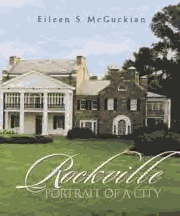
Rockville, Portrait of a City.
Hillsboro Press, Franklin, Tennessee, 2001.
Chapter 4, pp. 51-53.
© City of Rockville
Local Historian
Account
An account by local historian, Eileen McGuckian.
 |
McGuckian, Eileen S. Rockville, Portrait of a City. Hillsboro Press, Franklin, Tennessee, 2001. Chapter 4, pp. 51-53. © City of Rockville |
JEB Stuart Comes to Town
The tense but relative quiet in Rockville ended abruptly on Sunday, June 28, 1863. Elated by early May victory in Chancellorsville, Virginia, Confederate Gen. Robert E. Lee invded Northern territory the following month. As the bulk of Lee´s army moved through western Maryland toward Pennsylvania, 8,000 cavalrymen under Gen. J.E.B. "Jeb" Stuart crossed the Potomac near Seneca on the night of June 27. In this adventurous detour around the Union army, one Confederate brigade approached Rockville via Darnestown Road. The other two arrived on Falls Road, engaging Union pickets and small garrisons along the way.
Stuart´s reception in Rockville on June 28 was boisterous. Southern sympathizers--whose families would later claim Stuart kissed their babies, doffed a plumed hat to them, or shook their hands--cheered the dashing hero. Unionists scrambled to find hiding places in town and to protect their stores, families, and livestock. Students at the girls´ seminary near the courthouse fluttered handkerchiefs and ran out to greet the boys in gray. One Southern soldier described "a spectacle which was truly pleasing…. Gaily coloured dresses, low necks, bare arms, and wildernesses of braids and curls, were ... burning with enthusiasm to welcome the Southerner.… The whole façade of the building was a tulip-bed of joy and welcome."
The Confederates used the day in Rockville to their advantage. They cut the telegraph lines and took horses and supplies from area farms. Some dined at friendly homes. The New York Tribune reported that "Stuart commanded the Rebels in person, and was introduced to several of the rebel sympathizers in Rockville. The Rebels took every horse within four miles or Rockville, whether the owner was Unionist or traitor." A detail of the Ninth Virginia Cavalry rode down the Rockville Pike pursuing a four-mile-long Union wagon train, capturing some 170 wagons and hundreds of mules. The Confederates charged down the pike for six miles, breaking and burning wagons, enjoying Northern bacon and whiskey, taking prisoners, and emptying the Quartermaster´s store of forty thousand dollars in soldiers´ wages.
Stuart apparently knew who the pro-Union residents were, and where some might be, for he located the Episcopal Church on Washington Street where Northern-sympathizing vestrymen had taken refuge. Hours later, the Confederates left Rockville with shopkeeper John Higgins, Judge Richard Johns Bowie, commissioner of the draft Lawrence Dawson, Mortimer Moulden the Provost Marshal, and postmaster Thomas Bailey in tow. They went as far as Brookeville but, perhaps uneasy about the health of their prestigious captives, paroled most of them there. The remainder were released late Monday night, after which Dora Higgins, John´s wife, sat down to write her mother a detailed description of the recent events. "There were three brigades of Rebels in all, about 8,000," Dora wrote, "I broke down once only, through the day and that was when the children knew that their father was a prisoner. [The Rebels] behaved better than I expected; never entered the house. They feasted on Uncle Abe´s army rations."
When JEB Stuart met up with General Lee and the Army of Northern Virginia on the evening of June 2, two or three days of the Battle of Gettysburg were already over. Had Stuart's cavalry not spent two days flirting with young ladies and rounding up wagons and Unionists in Rockville, perhaps the outcome of the battle would have been different.